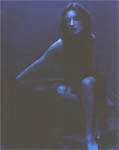|

songs | interviews | photos | tours | boots | press releases | timeline
Keyboard (US)
May 1999

musicmakers
Five questions with....
TORI AMOS
by Bryan Reesman
In a time when image seems more important than substance, and hipness and street cred tower over actual musical ability, confessional singer-songwriter Tori Amos is a wonderfully welcome anomaly. The classically trained rocker has taken her musical gifts and translated them into sophisticated yet accessible tunes that have reached a large audience. She has it all - image, talent, and hipness. Her fifth and most recent effort, From the Choirgirl Hotel (Atlantic), chronicles a new phase in her evolution that includes a full band - guitarist Steve Caton, bassist Jon Evans, and drummer Matt Chamberlain. The live results are high-impact and eclectic; she ignites the ethereal rock of "Spark," channels Zeppelin on "She's Your Cocaine," and gives techno an organic twist on "Raspberry Swirl."
1. Even though you've worked with a band in the past, Choirgirl Hotel is the first album with a full band feel. Did you write everything at the keyboard and then hand the parts to other musicians, or did you work on the arrangements together and improvise a lot of it?
I wrote a lot of it at the keyboard but also at the synth, too. I have a.... What do I have? [Chuckles.] I have a Kurzweil. The good thing is they maxed me out at Kurzweil with sounds, and then my friend came in and gave me a bunch of sounds - Mellotron sounds and stuff, 'tron viola, 'tron flute, 'tronny stuff like that. I started messing with them and in some cases writing things around some of them, like in "Hotel." So the keyboard was very present while I was writing. I wrote most everything before I walked into the studio.
2. You've talked about having a dialogue with your Bosendorfer.
Well the Bose...she's just in another league than the other ones. She's hand-made, and we got her MIDIed up so I can play with a band without all the feedback and stuff. If you played her, you would understand. Just in the action, the way she talks back to you as an instrument. She talks back in a different way.
3. In making the new record, how did you balance being musician and producer? When did you trade hats?
I'd tell the musician in me to leave the room sometimes, to go get a cup of tea, because she didn't need to hear that stuff. And a part of me left, then I dealt with things as the producer. The musician in me didn't want to get involved in confrontations sometimes. And how do you talk to other musicians without demoralizing them? That's a really important thing.
4. You used a wider range of keyboard sounds on this record, including mallet piano.
We made that happen a couple of years ago, me and Philly [Schenel]. Then he sampled it and gave me the sample.
5. How technical are you with synthesizers? Do you get involved with using music software or is that more of an area for your engineers Mark and Marcel?
No, they do all that crap. You kidding? No, I don't get into any of that. I just say, "Hey, find me some bitchin' sounds," and I know what to do with them once they find them. Most keyboard people's problem is they know how to get the sounds but they don't what to do with them. Let me tell you something. Most of these keyboard players - not all of them, some of them are innovative - but a lot of times it's like, "Oh, duh, obvious." It's about using sounds in ways that maybe you wouldn't. Like in "Raspberry Swirl," that sound isn't supposed to be used that way. The [she sings "dow-wow-wow wow-wow-wow"] disco sound where you're just supposed to hold it, I cut that off and it became something else. And that's why I think synths fall on their head, because it just becomes about people that aren't melodically zoned. They sit down and play the same crap over and over again. On every dance record, you know, you hear the same [sings "dun-dun duh dun-dun-dun"]. That's where keyboard players think they're keyboard players, and I'm like, no. You can get away with it on keyboards, but you can't really get away with that kind of stuff as a guitar player. I think it's so obvious when a guitar player can only play a few chords and a couple of riffs, whereas the keyboard player can have all this gear and all these sounds are coming out and it can be very distracting, and yet you realize all they can do is I-IV-V-I, man.
t o r i p h o r i a
tori amos digital archive
yessaid.com
|